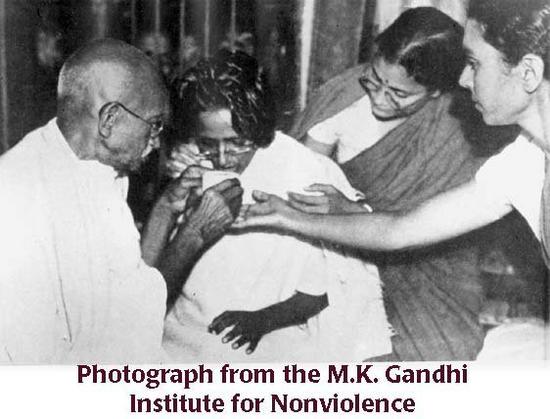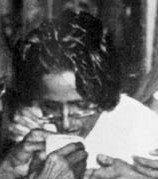Have you ever heard a name like that? Perhaps not. It would be even difficult then to believe that how close she was to Mahatma Gandhi, perhaps closest to him from any other person in Punjab. But does she belong to Punjab? Difficult to believe!

Bibi Amtus-Salam, one of those great but quiet nationalists, who gave everything to this nation yet no one knows about her or talks about her. She was the one who was with Mahatma Gandhi in Noakhali in 1946 when worst riots took place in Bengal and Gandhi went on fast unto death to bring peace. Gandhi treated her like her own daughter and wrote to her as frequently as he wrote to her granddaughter Kanu Gandhi.
Bibi Amtus-Salam, born in a Zimindar Pathan family of Patiala district and who had her maternal relations near Rajpura, was so dedicated to Mahatma Gandhi and his ideals that Gandhiji even scolded her many times for her extremely idealist behaviour and expectations. Thus, when her brothers and other family members left for Pakistan, she was enraged at their behaviour and expressed her disappointment to Gandhi at this development. Gandhiji had arranged for safe journey of her brothers to West Pakistan. Amtus-Salam wanted to return to Patiala, from where the Muslims including her family had evacuated to Pakistan. She wanted to go back to Patiala (from Noakhali where she was coordinating Gandhi’s work of reestablishing communal harmony) to demonstrate by living there, all by herself as a young Muslim woman, that she could dare the worst, perhaps even die, by way of exemplifying her absolute commitment to the cause of communal amity and peace.
V. Ramamurthi, in his book Mahatma Gandhi: The Last 200 Days, serialized and published by The Hindu, at Golden Jubilee of independence, has given marvelous account from Gandhi’s life and there Bibi or Miss Amtus-Salam figures prominently. Gandhi wrote to Miss Salam on 26 August 1947: “You are needlessly finding fault with your brothers. When all others lost courage there, they too decided not to risk their life. It is enough if we ourselves stand firm. Let us not sit in judgement on others though they may be our own relatives.
Gandhiji further wrote, “You are fickle-minded in wanting to go to Patiala. It is one and the same, whether you are in Noakhali or in Punjab. It is not that your place is only in the Punjab. Your place is everywhere.”
Again on the last day of 1947, i.e. on 31 December, according to Ramanathan, “the letters Bapu wrote was one to bring great joy to his Muslim disciple Amtus-Salam in Noakhali. She had been enduring the cruel pain of being torn from his side, ever since Bapu left that place and worked. Repeated she had asked for permission to come and join him in Delhi or at least to be nearer to him. Bapu wrote to her, “You will be glad to read this letter. I have given you permission to come.
Amtus-Salam was undergoing a great agony at the divide between Hindus and Muslims. To assuage her feelings, Gandhi wrote to her, “I have never felt that you are a Muslim and that I am a Hindu. The only feeling I have is that you are A.S. and I am Gandhi, where our atmans are concerned, we are one. In my view, you are the moving spirit behind whatever peace has been achieved in Noakhali. It was and still is your most significant work. Only you can sustain it. Wherever you stand, you stand in the capacity of my daughter, do you not? What can be done if you hold a different view, despite my opinion that you should forget all about Patiala? Blessings from Bapu.” (Mahatma Gandhi: The Last 200 Days, p. 443)

But Miss Amtus-Salam did not forget Patiala. During 1947-48 period, she along with Mrs Lajjawati Hooja, who was also a prominent Congress worker of All-India Women’s Congress, evacuated thousands of kidnapped Hindu and Muslim women to their respective homes in India and Pakistan. Lajjawati Hooja, who was very active in Jalandhar and associated with K.M.V. College, worked in three districts of Pakistan, including her native place Dera Ghazi Khan while Miss Amtus-Salam worked in Bahawalpur district. Lajjawati Hooja’s son and a Punjab Civil Service officer, G.B.K. Hooja was Liaison Officer at Lahore in this operation. G.B.K. Hooja later rose to become the Vice-Chancellor of Gurukul Kangri, Haridwar, and wrote books on martyrs and freedom fighters like Shahadatnama. Widowed quite early in life, Lajjawati Hooja’s younger son Bhupender Hooja entered I.A.S. after being Information Officer with the Government of India and became a Rajasthan cadre officer. He is the one who edited Shahid Bhagat Singh’s Jail Notebook for the first time in 1994 and published it under the title A Martyr’s Jail Notebook. Translations into Hindi, Punjabi and other languages have been made from this book. He is the chief editor of the Indian Book Chronicle from Jaipur, and at present is writing a book on freedom movement in Hindi as Safarnama. Bibi Amtus-Salam and Lajjawati Hooja worked in unison in the guidance of Rameshwari Nehru, a close relative of Pandit Jawaharlal Nehru, to mitigate the sufferings of thousands of innocent women.
Bibi Amtus-Salam established Kasturba Seva Mandir and other Khadi institutions in Rajpura town where she helped Hindu migrants from BahawalpurPakistan to settle down. Bibi Amtus-Salam did not hog any media publicity throughout her life and after serving this nation, she expired quietly on 29 September 1985. area of
At the time of moving towards close Indo-Pak relations, more than creating Jinnah like dramas, a little attention should also be paid to those unsung heroes and heroines of national movement who kept the lamp of humanity and communal harmony alight during the most turbulent periods like that of 1947. If we cannot honour the families of these chirags of insaniyat, let us at least salute their memory and ideals, even though these ideals have been trampled many times over since 1947.



